UFC Vegas 56: Felice Herrig 1-on-1 with Kevin Iole
Felice Herrig joins Yahoo Sports' Kevin Iole to preview her rematch Saturday against Karolina Kowalkiewicz at UFC Vegas 56. The UFC strawweight hasn't fought since August 2020 due to injury, but believes she can avenge her split-decision loss to Kowalkiewicz thanks to a change in camp and mindset.
Video Transcript
KEVIN IOLE: Hey, everybody. I am Kevin Iole. Welcome to Yahoo Sports. UFC is back on Saturday at Apex. And making her return after a long absence, I think I used to hear that in pro wrestling sometimes, is The Lil Bulldog, Felice Herrig. Felice, how are you?
FELICE HERRIG: I am doing good. How are you?
KEVIN IOLE: I'm awesome. Can't wait to see you fight Karolina Kowalkiewicz, a rematch of a fight you had a couple of years ago. You know, I just thought you're in an interesting place. You've had a lot going on in your life.
You know, you've been injured, you've written a book, you've done-- you've done a lot of things. Let's first just talk a little bit about how arduous it's been trying to get back, right? I mean, you've had really bad luck over, what, the last several years with injuries. But can you discuss how the injuries have kind of hurt you, both physically and mentally?
FELICE HERRIG: Yeah. Well, the thing is, it's not like I kept getting injured. I got the ACL-- I tore my ACL and my meniscus, and I had to get it repaired. And the surgeon didn't do a complete surgery, so he didn't fix my post-lateral corner. But I also didn't know this, nobody-- you know, other doct-- nobody could tell me what was going on.
So it takes like a year to recover from the ACL. And by the time we figured it out, like 14 months later, like what was going on, I needed another surgery. Because first off, he didn't fix the post-lateral corner. And because he didn't fix the post-lateral corner, my knee was unstable so my meniscus pulled out of the bone.
So I only needed the second surgery because the first surgeon didn't do a complete surgery. But mentally it is very hard just because the one thing that-- you know, have you had that one thing in your life that you find happiness from? It's like your escape, and you can't do it, and like really can't do it.
It's not like you can kind of train a little, like, you can't train at all. And then like, feeling like it's never getting better. Like you're doing everything to like-- and you're supposed to be progressing. And I felt like every time I would progress, then I would take like 10 steps back because it would get worse.
So that's mentally hard. They say that it's not if you can physically overcome an ACL surgery, it's if you can mentally overcome--
KEVIN IOLE: Right.
FELICE HERRIG: --an ACL surgery. And after the first surgery, I feel like I had hope after I knew like-- I found a good surgeon. He's in California. Dr. D. He gave me answers, like, oh, you're not crazy. Your knee still is messed up.
Because not having it done before, they always say, like, ACL is the worst surgery an athlete can go through. So every time I would have problems or be in pain, I thought it was just a part of the recovery process.
KEVIN IOLE: Right.
FELICE HERRIG: And that time would just make it get better. And like, it's mentally draining when you're like, it's not getting better, it's actually getting worse. But after I found that the surgeon who kind of gave me answers and fixed me. I had this new found motivation.
You know, because i was getting better. So it's like, if you go to the gym every day and you're trying to lose weight, and you keep gaining weight, you're like, I'm eating healthy, and I'm training hard, and I'm not losing weight. You have no motivation to go to the gym anymore. It's like, why?
KEVIN IOLE: I always thought of when there's a pepperoni pizza so I could to go to the gym.
[LAUGHING]
FELICE HERRIG: I said if you're eating healthy. But I just-- I don't know. And then I think too-- I haven't really talked about this in any of the other interviews, but before the surgery I was at a different gym. And I was feeling kind of stagnant there because when I first started there we had a ton of MMA fighters, and we had a team, and then over the years it became just a jujitsu gym.
So it was just me, and I had to pay to fly all these girls out, and I would stress about it. But during my knee surgery, like, after the first knee surgery, I found a new gym, Valle Flow Striking, and had a team again. And I feel like having people around you to push you, and to motivate you, and watching them fight, and watching them be successful and like, just team camaraderie is like a really, really big thing that I feel like mentally helped me a lot.
KEVIN IOLE: Well, let me-- I'll get into that in a second, but let me ask you about the first doctor. I just want to follow up on that because it's interesting. I would think that he knows you're a professional athlete, and that you're, you know-- it's not like you want to fix everybody correctly, but a professional athlete it's even more important to make sure that you get back.
Did you have discussion with him post-surgery about, like, what was going on, and was he aware that you were an athlete?
FELICE HERRIG: He was. He was aware going into the surgery that I was an athlete. But I think he's like more old school. He actually retired after my first surgery. I was one of his last three surgeries.
And then also everything happened with COVID. So it was during the beginning of the pandemic, so I couldn't see a surg-- like, nobody would see me.
KEVIN IOLE: Got it.
FELICE HERRIG: Because only-- you could only-- like, it was only like emergency patients, or like existing patients. And I needed to see a new surgeon for a doctor for a second opinion, and that didn't happen. So I was just in limbo. And I got offered to take a fight, and I was like, I knew I wasn't ready, but it was a year later.
And I was like, I should be ready, maybe it's just me being a baby with the pain. And you think, OK, time heals all wounds. Like, with time it'll just get better. And it didn't get better.
So I did the entire training camp. Like, I literally was taking like six ibuprofen every day just to train. And I was iced. Like, I have an hour drive to the gym, and I had to bring ice packs. And I would ice it on the way home.
KEVIN IOLE: Wow.
FELICE HERRIG: It was terrible. So, yeah. So then the second surgeon, Dr. D, who's in California, is just more progressive. You know, like, post-lateral corner is not-- I don't necessarily-- I can't really blame the old surgeon because I think he just was so stuck in the old ways.
KEVIN IOLE: Right.
FELICE HERRIG: Because post-lateral corner is almost like, it's newer. You know? Because I mean, he did fix the ACL technically. I don't know, like. He just didn't fix the post-lateral corner.
And I think too, being in Illinois. You know, like different areas, different states. Especially like California, I just feel like doctors are better.
KEVIN IOLE: A little more progressive there.
[INTERPOSING VOICES]
FELICE HERRIG: Yeah. More progressive. Even the PT was better there. Like, they were so conservative here in Illinois when I would do my PT. I'd be like, dude, I'm a professional athlete. I need to be pushed.
They were like-- treating me like I was this geriatric patient just trying to kind of maybe walk in a walker again. You know? Like it was--
KEVIN IOLE: Kind of how they would treat me.
FELICE HERRIG: Yeah. Yeah. I should send you to them. No.
[LAUGHING]
KEVIN IOLE: Thank you for that referral. I appreciate it
[LAUGHING]
FELICE HERRIG: You're welcome.
KEVIN IOLE: Let me-- let me run this past you. You know, I know the margins are tight for fighters, right? You know, you're not getting rich just fighting on UFC Fight's and everything.
And so I wonder, like, when you're out on injury for a long time like that, and then as you mentioned before, having to fly girls in to train with you even before that, right. I mean, I would imagine it made money tight. And what does that do to your life when you're-- you know, you're doing what you love, but you're not getting rich at it.
And you feel like you should be one of the best in the world. And if you're one of the best in the world, you should be making some dough. And here you are having these issues come up.
FELICE HERRIG: Well that was a big thing first. And that's another reason why I ended up fighting even though I shouldn't have. I needed to pull out, but a year later, like, not fighting, not getting paid. Luckily, I've had a lot of the same sponsors for years that have supported me.
And you know, with social media I get-- you know, I have a good manager that helps, you know, like, oh you're going to get paid such and such to do this post or whatnot.
KEVIN IOLE: Right.
FELICE HERRIG: So that helped a lot, but at the same time, being a professional athlete and wanting to get better, you need the best. And it's like, even not being able to afford getting a massage, or like, you know, my body work done, all those little things. It makes you more desperate to feel like you have to fight again.
That's why I-- because my last fight, I did fight with a injury.
KEVIN IOLE: The injury, yeah.
FELICE HERRIG: And it didn't go good. But I was like, I just-- I need to get paid. And I've already done all the hard work in the training camp, so I might as well just go fight and get paid. But then and also, it's a snowball effect because then you put your heart out there, and you go and you lose in front of millions of people. And they're all saying how bad you suck, and you should retire, and how you should hang it up.
So that adds another mental layer because-- I mean, you shouldn't listen to what the people say, but it's really hard not to. And you want to defend yourself, and you-- but it's like, how can you because people are mean. They're mean no matter what. Like, they want to bring you down.
And it's hard to show your face, you know? It's like-- you're like, oh my God. They're looking at me like I'm a loser. But I feel like mentally I kind of overcame all that.
My friend Carla Esparza, she's now the UFC 115 champion.
KEVIN IOLE: The champ with the wedding dress on.
FELICE HERRIG: Yeah. But she-- after my first surgery-- so she hooked me up with the doctor, Dr. D, who fixed me. But she also gave me this book called "The Power of the Subconscious Mind", and I feel like it changed my life. I started reading it, and then like really putting it into action, like, everything from the book, and really focusing on it.
And things just gravitated towards me. Like money issues-- you know, I got to sign the UFC panini cards, and I got paid for that. Because we're going back to the financial thing. You know, and sponsors would be like, oh we want you to post this, you know, money just kept flowing to me at that point.
KEVIN IOLE: Good for you.
FELICE HERRIG: And so that was motivating. And you know, I felt like everything just changed for me.
KEVIN IOLE: Well, after you talked about all that good, I don't want to be a Debbie Downer, but I will ask you one-- because I think it has to be asked. You know, so you fought with an injury, and you lost the fight. You're going into this fight having lost three in a row, and you're in your 37 years old, right?
So you know what happens to fighters who lose four in a row. And so I imagine you're fighting a good fighter in Karolina that you've fought before. Imagine there's a heap of pressure on you, and how do you keep the thoughts of your job?
Like, I want to just keep this job out of your mind because you can't think that when you're fighting. You have to just perform. So how do you put that on the back burner so to speak and focus on just--
[INTERPOSING VOICES]
FELICE HERRIG: It's on the back burner. It's not really a thought in my mind. I feel like-- so fighting desperate is not good. I feel like I'm happy now, which is great.
I feel like I'm more confident. I'm more positive. I feel like my training's better. I feel like I'm healthier. I'm stronger than ever.
And I've honestly just-- I've ticked all the boxes of every single thing that I need to do to win this fight. And if I didn't win the fight, I feel like it's the universe saying that it's time to close this chapter in your life.
KEVIN IOLE: Sure.
FELICE HERRIG: And I really do believe that. I really feel that I have done everything to win. And if I don't win, then something-- there's something else for me. Because I've been fighting for 20 years. So for me I have nothing left to prove in this game.
You know, if I go out like that, it's like-- it's whatever. But I don't have that desperation anymore, like, I have to win. I have to win. No. If I get cut from the UFC, I get cut from the UFC.
I'm also a great boxer. You know I can go-- like, I could still fight if I wanted to. You know, other promotions would be willing to take me on if that's what I chose to do. But I feel like everything comes down to my performance. If I perform the way I have been performing and training, I will win this fight. And that's-- and that's that.
KEVIN IOLE: I'm gonna ask you about the fight, but I want to sneak in one non fighting question here, and that is about your book. You know, I love that you wrote a children's book. And I want you to tell me about that.
But I also wonder, did that-- you know, you wrote it, and your father illustrated it for you. Did that help your relationship with your father? I mean, not that you had a bad relationship, but like collaborating with him on a project like that, did that do something for father and daughter in terms of the relationship?
FELICE HERRIG: Oh, it did because we had something to collaborate on. We saw each other constantly because we were going over the book, and book ideas, and the illustrations, and the characters. Like, the characters took a while to develop.
You know, me like, oh, I want the-- The Lil Bulldog's got to have rainbow hair. And you know, we got to have-- you know, [INAUDIBLE], he's got to have like this logo on him. So we are constantly talking about the book. He was constantly sending me drawings.
Like, so we were just constantly talking. But also a back story with that is-- so my baby brother died of pancreas cancer when I was 7. And my dad is like an amazing, amazing artist Illustrator, like, the best I've ever seen. Anyone can attest to that.
And he hadn't drawn since my brother died.
KEVIN IOLE: Oh wow.
FELICE HERRIG: And I'm not saying it's a correlation, but after my brother died he got depressed, and drawing is like an outlet or something that he loved and he just didn't do it anymore. So the first time he ever drew again was when I asked him to do the book with me. I
KEVIN IOLE: Love that. Good for you.
FELICE HERRIG: So that was very special.
KEVIN IOLE: So how was the experience of writing a book, and do you think you'll try your hand at another one?
FELICE HERRIG: You know, I feel like-- I mean, I loved writing the books. I loved doing them with my dad, you know, the children's book, but they're very-- it was a good distraction during my time off. You know, I wanted to create the Lil Bulldog character, which is me, and do a children's book.
But it was not-- like, there was like no money in it. And not that it's about the money, but like the time versus the money, and now I don't have that much time. I feel like if I did write a book it would be more on like a biography type.
You know, about like everything I've gone through in this sport--
KEVIN IOLE: The life of Felice. Yeah.
FELICE HERRIG: --and the injuries and overcoming that. Yeah. I'm not saying I'm going to do that. I'm saying maybe I will. Who knows.
[INTERPOSING VOICES]
FELICE HERRIG: Who knows what the world of Felice has.
[LAUGHING]
KEVIN IOLE: Well, let's wrap on this. Because I appreciate your time, and I know it's valuable. I don't want to keep you. Karolina is kind of a must win situation as well I would think, right? So you fought her once before. What is she good at, and what do you think is going to be the key for you to win this fight?
FELICE HERRIG: Karolina is very good in the clinch. I feel like especially because she's gotten beat beaten up a little bit in her last few fights, I feel like she might be more timid and fearful. And I feel like I just need to come at her. And like show her, no I'm here. I'm not going to play this little tit for tat game. I'm going to come at you, and I'm going to be in your face, and you're going to be in a fight.
And I feel like I just need to be aggressive. And work in all the wrestling I've been working on. My striking is great. I feel like everything-- every aspect of my game I've gotten better at.
I mean, who knows. I mean, maybe she has too, but I don't feel like the level that she's jumped since our last fight would be as much as I've jumped. And it was a split decision. And I feel like the only edge she had on me was the clinch. And I've worked tirelessly on that.
And I've also worked on, you know, like-- when I would have her in a body lock, I wouldn't get it. I was like what's the next step. And I've worked on that a lot. So we'll see. You know? I feel like I'm going to win.
KEVIN IOLE: We will see the fruits of that labor on Saturday. You can see Felice Herrig on ESPN+ against Karolina Kowalkiewicz on-- what is it, UFC Vegas 57, I think. Or 58, maybe.
[INTERPOSING VOICES]
FELICE HERRIG: I don't even know.
[LAUGHING]
KEVIN IOLE: But it's at Apex on Saturday.
FELICE HERRIG: Couldn't tell you.
KEVIN IOLE: That's all you need to know. ESPN+. Felice, I appreciate you. Good luck to you. Thank you so much for your time.
FELICE HERRIG: Thank you.
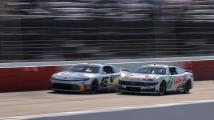
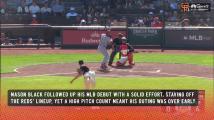
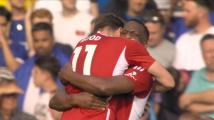


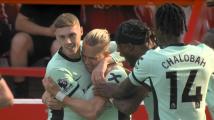
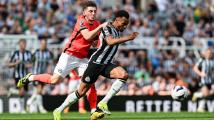
![Timberwolves lose to Nuggets: KAT reacts [RAW]](https://s.yimg.com/uu/api/res/1.2/DDo9vIomufyDg2tbS4b.Tw--~B/Zmk9c3RyaW07aD0xMjA7dz0yMTQ7YXBwaWQ9eXRhY2h5b24-/https://media.zenfs.com/en/kmsp_fox_local_videos_345/e76a0955bbad1e43d6ae7319eea8e774)